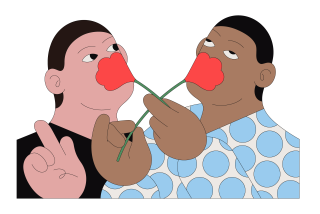First person: One singular sensation
The first person to discover my secret was my sister. In a routine phone conversation, I said, “You know when someone’s telling you a story and you get that amazing tingly feeling in your scalp, like their words are massaging your brain?”
I could imagine her scrunched-up face as she responded, “Huh? You’re crazy.”
I’m not sure why I waited until I was in my 20s to tell anyone that I felt an intense sensation on my head when I heard certain sounds. Maybe I’d always assumed that it happened to everyone. Or maybe it was because the feeling was so intimate — as though a ringing bell, a piano trill or a person’s whisper was literally touching me.
A couple of months later, my sister called me with some news. “You know that tingly thing you have?” she said. “Dad has it too!” Then she passed the phone to my father and the two of us had a long conversation about the thrilling roar of the vacuum and the way the song “Ave Maria” could feel like wing beats grazing our foreheads.
I soon learned that this phenomenon I was experiencing was hereditary. And it had a name: synesthesia, which if you break it down to its Greek roots means “joined sensation” (syn = together, esthesi = sensation).
In this unusual neurological condition, a stimulus perceived through one sense activates another sense. Some synesthetes see colors when they hear sound or taste flavors when they read words.
When I hear sounds, I feel them as tactile sensations. The same goes for certain tastes. For instance, chile peppers and ginger candies cause an explosion of tingly sensations to spread across the crown of my head, like honey dripping down my scalp. This synesthetic feeling is much more enjoyable than the actual touch.
Sometimes I crave the feeling. I admit I go to yoga class mostly for the sensations I get in my head when the instructor’s words cascade over my scalp. Sometimes I’ll try to get a stranger to tell me a story just so I can see how their voice feels.
And there have been times when my synesthesia was inconvenient. I once assigned oral reports to my high school biology students only to realize later that perhaps it wasn’t such a good idea to have students massage me with their presentations on genetic disorders.
But mostly I simply enjoy the fact that I experience the world of sound and touch in a different dimension than most people. That when I go to a concert with a friend, she’ll appreciate how the music makes her want to dance while I appreciate how the music dances within me.
To me, this is the most intriguing aspect of synesthesia: the idea that each of us perceives reality so differently from one another. I’ve always fantasized about entering someone else’s brain for a day, to see if the color blue viewed through their eyes was the same as my color blue. But I’d only do it if I could trade back brains at the end of the day — I think I’d miss my synesthesia too much to live without it.





